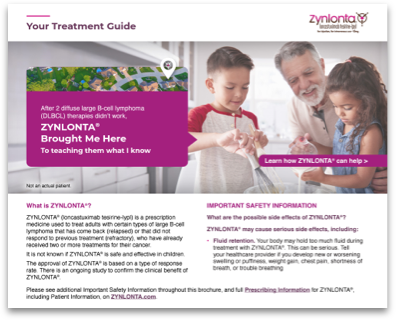Here for you any way we can be
Whether you’re living with diffuse large B-cell lymphoma (DLBCL) or take care of someone who is, we’re committed to helping you reach your “here,” a place where you feel most like yourself. As you reach your daily goals, know that we are here to support you. Scroll for downloads, information on what to bring up at your next appointment, how to pay for your medicine, and what communities are out there for you.
Downloadable info for people with DLBCL
Patient brochures

Go to the interactive English patient brochure
Go straight to the info you’re looking for on your phone, tablet, or computer.

Get the ZYNLONTA® patient brochure
Get all of the ZYNLONTA® information found on this website on your phone, tablet, or computer.

Obtenga el folleto del paciente para ZYNLONTA®
Coloque toda la información de ZYNLONTA® que se encuentra en esta pagina de web en su teléfono, tableta o computadora.
Questions to ask your doctor
After trying 2 or more therapies, discussions about your options are crucial. Find questions made to open up the conversation with your doctor about ZYNLONTA®. Download the list![]()
Essentials for Infusion: Your Guide to ZYNLONTA®
This guide can help you feel prepared and informed about your infusion experience.
Download the ZYNLONTA® Treatment Guide![]()
Downloadable resources for caregivers
Here to Help: The ZYNLONTA® Caregiver Companion
Get tips on how to prepare for infusion appointments and support yourself as you care for someone through treatment.
Know what to ask the doctor
Have productive conversations by asking these questions about ZYNLONTA® treatment.
Planning for the infusion
Get questions to ask about logistics and considerations for infusion appointments.
Go to helpful pages
Discussions with your doctor
Learn what relapsed/refractory means and get questions to ask about therapy. Use the treatment history tool to find out if ZYNLONTA® may be right for you.
About ZYNLONTA® infusions
Learn how ZYNLONTA® can help you focus on time between treatments.
ZYNLONTA® treatment savings
Learn how you can get financial assistance through programs like ADVANCING Patient Support.
Community support
Find groups and individuals who understand what you’re going through.
Caregiver resources
Get tips and tools to help you and the person you care for navigate DLBCL.
Frequently asked questions
For quick answers to your questions, check out the FAQ section of the website.
Get info on antibody-drug conjugate technology
Antibody-Drug Conjugate — Also called ADC. A substance made up of a monoclonal antibody (also called mAb) that is chemically linked to a drug. The mAb binds to specific proteins found on certain types of cells, including cancer cells. The drug enters these cells and kills them. Some ADCs are used to treat cancer.
What is ZYNLONTA®?
ZYNLONTA® is a prescription medicine used to treat adults with certain types of large B-cell lymphoma that has come back (relapsed) or that did not respond to previous treatment (refractory), who have already received two or more treatments for their cancer.
It is not known if ZYNLONTA® is safe and effective in children.
The approval of ZYNLONTA® is based on a type of response rate. There is an ongoing study to confirm the clinical benefit of ZYNLONTA®.
IMPORTANT SAFETY INFORMATION
What are the possible side effects of ZYNLONTA®?
ZYNLONTA® may cause serious side effects, including:
- Fluid retention. Your body may hold too much fluid during treatment with ZYNLONTA®. This can be serious. Tell your healthcare provider if you develop new or worsening swelling or puffiness, weight gain, chest pain, shortness of breath, or trouble breathing
- Low blood cell counts (platelets, red blood cells, and white blood cells). Low blood cell counts are common with ZYNLONTA® but can also be serious or severe. Your healthcare provider will monitor your blood counts during treatment with ZYNLONTA®. Tell your healthcare provider right away if you get a fever of 100.4°F (38°C) or above, or any bruising or bleeding
- Read full Important Safety Information
- Infections. Serious infections, including infections that can cause death, have happened in people treated with ZYNLONTA®. Tell your healthcare provider right away if you have new or worsening signs or symptoms of infection
- Skin reactions. Serious skin reactions have happened in people treated with ZYNLONTA®. Tell your healthcare provider if you get new or worsening skin reactions, including sensitivity to sunlight, skin rash, peeling, redness or irritation. You may burn more easily or get severe sunburns
The most common side effects of ZYNLONTA® include:
- feeling tired or weak
- skin rash
- swelling
- nausea
- muscle or joint pain
- increase in blood sugar (hyperglycemia)
- changes in certain blood or laboratory tests
ZYNLONTA® may cause fertility problems in males which may affect your ability to father children. Talk to your healthcare provider if this is a concern for you. These are not all of the possible side effects of ZYNLONTA®.
What should I avoid while receiving ZYNLONTA®?
Avoid or limit your exposure to sunlight, including sunlight through glass, such as buildings or vehicle windows and artificial sunlight such as sunlamps or tanning beds. Exposure to sunlight during treatment with ZYNLONTA® can cause skin reaction or rash. Use sun protection measures such as sunscreen and wear loose-fitting clothes that cover your skin while out in sunlight.
Before you receive ZYNLONTA®, tell your healthcare provider about all of your medical conditions, including if you:
- have an active infection or have had one recently
- have liver problems
- are pregnant or plan to become pregnant. ZYNLONTA® can harm your unborn baby
Females who can become pregnant:
- your healthcare provider may do a pregnancy test before starting treatment with ZYNLONTA®
- you should use effective birth control (contraception) during treatment with ZYNLONTA® and for 10 months after the last dose of ZYNLONTA®. Talk to your healthcare provider about effective birth control. Tell your healthcare provider right away if you become pregnant or think that you are pregnant during treatment with ZYNLONTA®
Males with female partners who can become pregnant:
- you should use effective birth control (contraception) during treatment with ZYNLONTA® and for 7 months after the last dose of ZYNLONTA®
- are breastfeeding or plan to breastfeed. It is not known if ZYNLONTA® passes into breast milk. Do not breastfeed during treatment with ZYNLONTA® and for 3 months after the last dose of ZYNLONTA®
Tell your healthcare provider about all the medicines that you take, including prescription and over-the-counter medicines, vitamins, and herbal supplements. Know the medicines you take. Keep a list of them to show your healthcare provider or pharmacist when you get new medicine.
You may report side effects to the FDA at (800) FDA-1088 or www.fda.gov/medwatch. You may also report side effects to ADC Therapeutics at 1-855-690-0340.
Please see the full Prescribing Information for ZYNLONTA®, including Patient Information, for additional Important Safety Information.
What is ZYNLONTA®?
ZYNLONTA® is a prescription medicine used to treat adults with certain types of large B-cell lymphoma that has come back (relapsed) or that did not respond to previous treatment (refractory), who have already received two or more treatments for their cancer.
It is not known if ZYNLONTA® is safe and effective in children.
The approval of ZYNLONTA® is based on a type of response rate. There is an ongoing study to confirm the clinical benefit of ZYNLONTA®.
IMPORTANT SAFETY INFORMATION
What are the possible side effects of ZYNLONTA®?
ZYNLONTA® may cause serious side effects, including:
- Fluid retention. Your body may hold too much fluid during treatment with ZYNLONTA®. This can be serious. Tell your healthcare provider if you develop new or worsening swelling or puffiness, weight gain, chest pain, shortness of breath, or trouble breathing
- Low blood cell counts (platelets, red blood cells, and white blood cells). Low blood cell counts are common with ZYNLONTA® but can also be serious or severe. Your healthcare provider will monitor your blood counts during treatment with ZYNLONTA®. Tell your healthcare provider right away if you get a fever of 100.4°F (38°C) or above, or any bruising or bleeding
- Read full Important Safety Information
- Infections. Serious infections, including infections that can cause death, have happened in people treated with ZYNLONTA®. Tell your healthcare provider right away if you have new or worsening signs or symptoms of infection
- Skin reactions. Serious skin reactions have happened in people treated with ZYNLONTA®. Tell your healthcare provider if you get new or worsening skin reactions, including sensitivity to sunlight, skin rash, peeling, redness or irritation. You may burn more easily or get severe sunburns
The most common side effects of ZYNLONTA® include:
- feeling tired or weak
- skin rash
- swelling
- nausea
- muscle or joint pain
- increase in blood sugar (hyperglycemia)
- changes in certain blood or laboratory tests
ZYNLONTA® may cause fertility problems in males which may affect your ability to father children. Talk to your healthcare provider if this is a concern for you. These are not all of the possible side effects of ZYNLONTA®.
What should I avoid while receiving ZYNLONTA®?
Avoid or limit your exposure to sunlight, including sunlight through glass, such as buildings or vehicle windows and artificial sunlight such as sunlamps or tanning beds. Exposure to sunlight during treatment with ZYNLONTA® can cause skin reaction or rash. Use sun protection measures such as sunscreen and wear loose-fitting clothes that cover your skin while out in sunlight.
Before you receive ZYNLONTA®, tell your healthcare provider about all of your medical conditions, including if you:
- have an active infection or have had one recently
- have liver problems
- are pregnant or plan to become pregnant. ZYNLONTA® can harm your unborn baby
Females who can become pregnant:
- your healthcare provider may do a pregnancy test before starting treatment with ZYNLONTA®
- you should use effective birth control (contraception) during treatment with ZYNLONTA® and for 10 months after the last dose of ZYNLONTA®. Talk to your healthcare provider about effective birth control. Tell your healthcare provider right away if you become pregnant or think that you are pregnant during treatment with ZYNLONTA®
Males with female partners who can become pregnant:
- you should use effective birth control (contraception) during treatment with ZYNLONTA® and for 7 months after the last dose of ZYNLONTA®
- are breastfeeding or plan to breastfeed. It is not known if ZYNLONTA® passes into breast milk. Do not breastfeed during treatment with ZYNLONTA® and for 3 months after the last dose of ZYNLONTA®
Tell your healthcare provider about all the medicines that you take, including prescription and over-the-counter medicines, vitamins, and herbal supplements. Know the medicines you take. Keep a list of them to show your healthcare provider or pharmacist when you get new medicine.
You may report side effects to the FDA at (800) FDA-1088 or www.fda.gov/medwatch. You may also report side effects to ADC Therapeutics at 1-855-690-0340.
Please see the full Prescribing Information for ZYNLONTA®, including Patient Information, for additional Important Safety Information.
